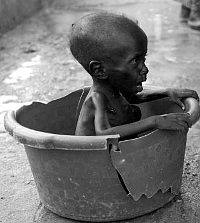- Click on The Hunger Site (and its affiliates: The Breast Cancer Site, The Child Health Site, The Literacy Site, The Rainforest Site, and The Animal Rescue Site) every day, for free.
- Use Search Kindly for your web searches.
- Shop through iGive.com.
- Have a clothes swapping party and donate any unwanted clothes to charity.
- Have your children in charge of recycling! Every ton of paper recyled saves 380 gallons of oil.
- Once a week, have an "unplugged" family night.
- Evaluate your car usage. Do you need to use the car for every errand? Walking 10 miles during a week instead of driving saves 500 pounds of CO2 emissions!
- Use natural cleaning products, such as these.
- BUY LOCAL:
With the upcoming growing season and fresh vegetables and fruit arriving, please take the extra time to buy local and support our local farmers. More and more farms are struggling and as we lose farms, we lose not only access to fresh, locally grown vegetables and fruit but we lose jobs, open space, tax dollars and more. Please support our local farmers. Buying locally grown food also helps the environment. For more information, please click here.
- Freecycle.com:
This site is a great way to get things you may need for free, get rid of things you no longer want and is also good for the environment. There is no cost to join this and you'd be surprised what people are giving away from phones, to old train sets, to household items, children's toys and more. A great form of recycling!
- Advocate for better education for all.
- Volunteer in public schools.
- Advocate, write letters.
- Contribute or volunteer at food programs.
- Knit hats or blankets for children in the Third World: they don't have incubators. Advocate for better education for all; volunteer in public schools.
- Be a Big Brother or Sister.
- Volunteer.
- Educate yourself about poverty issues and then educate others.
- 29 cents- The cost for a WFP food ration that feeds one malnourished person a day.
- Buy local: support local farmers, stores, artists.
- Buy Fair Trade products.
- Buy used and recycled items: thrift stores, antiques stores, second hand stores, yard sales.
- Fast one day and donate the money.
- Paper or plastic? Bring your own cloth bag and save the environment.
- Drink tap water, not bottled water.
- FACTS: According to the United Nations, if we took half of what is currently spent on bottled water (approximately $100 billion annually) and invested it in water infrastructure and treatment, everyone in the world could have access to clean drinking water.
- The U.S. EPA sets more stringent quality standards for tap water than the FDA does for bottled water. Approximately 40% of bottled water is actually tap water. It takes 1.5 billion barrels of oil to produce the plastic for water bottles. According to the Container Recycling Institute, only 14% of plastic water bottles are recycled. A water bottle in a landfill will take more than 1000 years to biodegrade.
- Practice conscious, socially responsible living.
- Cut down on your consumption, and live more simply.
- Shop less.
- Cut back on your gas consumption. Whenever possible, walk, ride a bike, take public transportation, or carpool.
- Keep your house as energy-efficient as possible: Use as little electricity, heat and hot water as possible. Install energy-efficient lighting and appliances. Choose an electricity supplier that offers renewable energy.
- Be prepared for an emergency. Stock up on emergency supplies; buy a handcrank flashlight/radio; have a supply of water, nonperishable foods, necessary medicines on hand, have an emergency plan.
- Recycle: stop receiving catalogs and junk mail.
Line by Line web design
